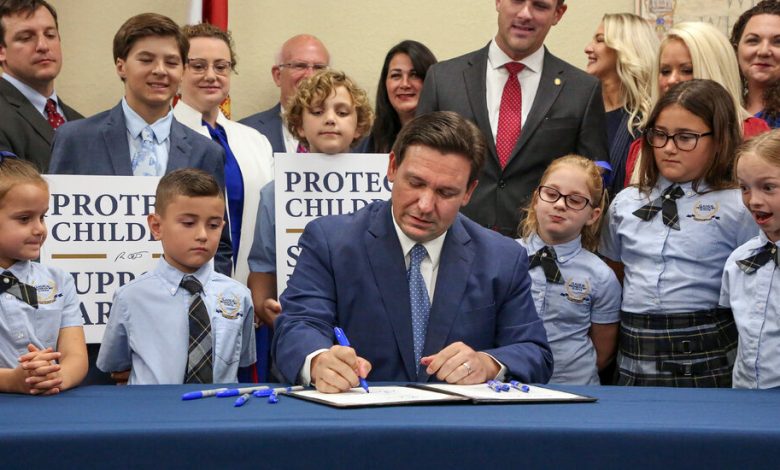In Florida, New School Laws Have an Unintended Consequence: Bureaucracy

Got a cut and need a Band-Aid? Want to be called Will instead of William? Or get your vision checked?
Across Florida, hundreds of thousands of students need permission slips for what was once routine in schools.
Educators in the state say recent laws and regulations around parental consent have created an entirely new bureaucracy, filled with forms and nagging phone calls to parents. The requirements have made it more difficult to provide services to children who need them — even services like vision and hearing tests.
“Nurses are spending most of their time trying to obtain permission” from parents, said Lisa Kern, director of the Florida Association of School Nurses. That permission does not always come, as busy parents — particularly those who work several jobs or do not speak English — sometimes do not respond.
The well-being of children, Ms. Kern said, “is taking a hit.”
New laws and regulations under Gov. Ron DeSantis, including his signature Parental Rights in Education Act, are intended to push back against what many conservatives see as liberal orthodoxies embedded in the school system — especially around gender and race — and that they say undermine the role of parents.
But some of the state regulations are vaguely written, school staff said, leading to confusion about exactly which school activities require written consent.
The state’s 67 districts have interpreted the laws differently. Because violating the rules could result in lawsuits or school staff members losing their jobs, many districts have proceeded cautiously, requiring permission slips for an ever-expanding list of activities and services.
The Florida Department of Education did not respond to questions about how consent forms have affected students’ access to school services.
Cailey Myers, a department spokeswoman, wrote in an email that “In Florida, we continue to prioritize parental rights, expand school choice and focus on educating our students, not indoctrinating students.”
While no state has gone as far as Florida with parental consent requirements, dozens of states are considering bills inspired by Florida’s laws.
Tiffany Justice, a founder of Moms for Liberty, argued that it was the school’s responsibility to prove to parents that services outside the core curriculum are helpful to children. “If it’s important, they will work hard to get parents informed,” she said.
Here are some of this year’s consent forms.
From Michael to Mike
This school year, several districts began to require parents to fill out a form authorizing teachers to call their children by different names, even common nicknames — a response to a state requirement that schools establish procedures for parents to “ensure the use of the child’s legal name in school.”
In Collier County, in southwest Florida, 13,900 students have returned such forms online or on paper, and a school employee had to process each one.
The political motivation behind the rule was to restrict school staff from affirming transgender students’ identities. But to protect themselves from liability, some districts chose to interpret the regulation broadly.
No Permission Slip? Then No Bandage.
Under the state’s parental rights law, parents must be able to opt out of school health care services for their children.
In some districts, parents must sign permission forms before their children are given state-mandated screenings for vision, hearing and scoliosis.
The state has not published data on how many students received health screenings since the law took effect in 2022. But The Orlando Sentinel found that in Orange and Seminole Counties, a total of 50,000 fewer children had their eyesight checked during the 2022-2023 school year, compared with the previous year.
Typically, state data shows “abnormal screening results” in about 11 percent of school vision tests, which suggests that in those two districts, roughly 5,000 children may have missed the chance to correct their vision.
In some districts, students without written consent cannot get even a Band-Aid or ice pack after a fall, and must be sent home.
At the start of the school year, staff members were overwhelmed by the need to hunt down the forms, said Debbie H. Fisher, health coordinator for Volusia County Schools, northeast of Orlando.
Before the parental rights law, 89 percent of students who saw a school nurse returned to class. The state has not released new data. But anecdotally, across the state, Ms. Kern said, “We have more kids going home.”
“That really has an impact on academics,” she said. “A kid is not in their seat learning.”
Some Limits on Books Are Not About Content
A separate law, House Bill 1069, which passed in May, requires districts to allow parents to limit their children’s access to library materials.
In many districts, that means yet another permission slip.
In Lee County, on the Gulf Coast, students whose parents do not return the form get only “limited access,” meaning they cannot check out books that have been formally challenged for inappropriate content, even if the title was later cleared.
According to the district, only about 3 percent of students have limited or no access because their parents declined to give consent. But another 40 percent of students have limited access because their parents have not returned the form.
Books challenged in Lee County include ones with themes of gender, sexuality and racism, among other topics. Some classics have been challenged, including “Slaughterhouse Five,” by Kurt Vonnegut, and “Beloved” and “The Bluest Eye,” by Toni Morrison.
In Collier County, the school district decided at the beginning of this school year that students could not check out any book unless parents gave written permission. About a quarter of parents did not return the forms; the district is now adjusting the policy.
“This is an attempt to alleviate what could be an impediment to student achievement,” said Chad Oliver, a district spokesman. He indicated that the state is allowing the change.
Kris Smith, a school librarian and president of the Florida Association for Media in Education, a professional association, said she had observed that students who struggle with reading are most likely to lack a permission form. Those children, she said, would benefit most from borrowing books that interest them.
“The parents who really want to be contacted and involved? I don’t see that as a burden,” she said, adding, “The problem I see is the few students I have whose parents are never responding.”
Should Counseling Require Permission?
Under the various parental consent laws, schools must notify parents “if there is a change” in the mental health services a student receives.
Some districts have interpreted this language to mean that one-off visits to a counselor — to discuss a bad grade or tension with friends, for example — do not require consent, while “frequent fliers” to counselors should have a permission form on file, said Carmen Larson, a middle school counselor and past chair of the Florida School Counselor Association.
The paperwork burden can be significant, because more children need frequent counseling now than in the past, Dr. Larson said, as childhood and adolescent anxiety is on the rise.
But Ms. Justice, of Moms for Liberty, argued that any meeting with a counselor should require consent, not just meetings that occur frequently. “Something that might not be a big deal to a counselor might be a big deal to a parent. There is a lot of subjectivity around that,” she said.
In Monroe County, in the Florida Keys, a form asks for consent to mental health programs, including some counseling services and a state “resiliency education” program, which covers topics such as empathy, conflict resolution and time management.
The Monroe County school district did not respond to interview requests or questions about the form.
Like other counselors and nurses, Dr. Larson said keeping parents informed has always been an important part of her job, well before the new consent paperwork. And it’s rare, she said, that a parent would reject counseling services for their child.
Still, schools have good reason to hunt down the consent forms, given the tough penalties built into the regulations.
“Everybody is afraid to get sued,” Dr. Larson said.



